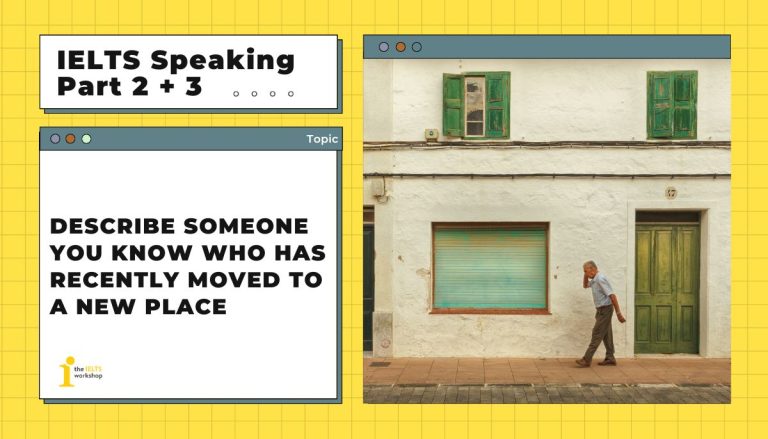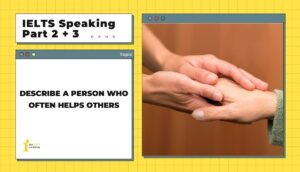Trong chuyên mục giải đề dưới đây, cô Nguyễn Mai Linh của The IELTS Workshop HN sẽ hướng dẫn bạn trả lời topic “Describe someone you know who has recently moved to a new place“ trong IELTS Speaking Part 2. Cùng tham khảo sample, từ vựng và một vài cách diễn đạt ghi điểm trong phần thi IELTS Speaking nhé.
Part 2: Describe someone you know who has recently moved to a new place
Describe someone you know who has recently moved to a new place
You should say:
Who he/she is
What the new place is like
Why he/she moved to a new place
And explain whether his or her move has a positive impact on you?
Dưới đây là bài mẫu cho topic “Describe someone you know who has recently moved to a new place“.
1. Bài mẫu (Sample)

2. Từ vựng (Vocabuary)
- Bustling (adj): đầy sự náo nhiệt
- Vibrant (adj): đầy sức sống
- Metropolis (n): thành phố lớn
- Skyscraper (n): tòa nhà chọc trời
- Diverse (adj): đa dạng
- Fast-paced (adj): nhanh nhạy
- Thriving (adj): thịnh vượng
- Primarily (adv): chủ yếu
- Career opportunity (n phr): cơ hội nghề nghiệp
- Determined (adj): quyết tâm
- Pursue (v): theo đuổi
- Professionally (adv): chuyên nghiệp
- Well-established (adj): được thiết lập tốt
- Firm (n): công ty
- Prospect (n): triển vọng
- A great excuse (n phr): lý do tốt
- Absence (n): sự vắng mặt
- Void (n): khoảng trống
- Presence (n): sự hiện diện
- Get-together (n): cuộc tụ họp
Part 3
1. Why do some young people keep moving?
2. What is the difference between living alone and living with roommates?
3. Is it possible for young people to live by themselves?
4. Besides cooking, are there any other skills that people need to learn if they live on their own?
5. What kinds of people tend to live by themselves?
6. How can parents and teachers help young people to live independently?
1. Why do some young people keep moving?
Many young people are on the move for a variety of reasons. First and foremost, career opportunities often play a pivotal role in their decisions. Young adults, especially in the early stages of their careers, may be seeking positions that align better with their ambitions or offer higher salaries. This often involves relocating to cities or regions with a more promising job market in their chosen fields. Additionally, higher education can be a driving force for relocation. Young people may move to attend universities or colleges that specialize in their area of interest, which can result in moving to different cities or even countries.
Moreover, some young individuals are drawn to the adventure and excitement of exploring new places and experiencing different cultures. Traveling and moving can be seen as a means of personal growth and self-discovery. In today’s interconnected world, it’s easier than ever for young people to connect with others globally, making the idea of moving to a new place more appealing.
- pivotal (adj): Quan trọng và có vai trò quyết định.
- promising (adj): Đầy triển vọng.
- ambition (n): Hoài bão.
- relocation (n): Việc di chuyển đến nơi khác.
- driving force (n): Lực đẩy, sự thúc đẩy.
- seek (v): Tìm kiếm.
- align with (v): Thích hợp với.
- relocate (v): Di chuyển đến nơi khác.
- specialize (v): Chuyên sâu vào một lĩnh vực cụ thể.
- individual (n): cá nhân
- interconnected (adj): có liên kết với nhau
2. What is the difference between living alone and living with roommates?
Living alone and living with roommates offer distinct experiences. Living alone provides individuals with a high degree of autonomy and privacy. You have complete control over your space, allowing you to arrange it according to your preferences and live by your schedule. It’s an opportunity for self-discovery and personal growth as you’re solely responsible for managing all aspects of your life, from budgeting to daily chores.
On the other hand, living with roommates involves sharing living spaces and responsibilities. The primary benefit is cost-sharing; rent, utilities, and other expenses are divided among the occupants, making it more financially feasible, especially in high-cost urban areas. Roommates can also provide companionship and social support, reducing feelings of isolation.
- distinct (adj): riêng biệt
- autonomy (n): quyền tự trị
- privacy (n): sự riêng tư
- preference (n): sự ưa thích
- solely (adj): chỉ
- budgeting (n): lập ngân sách
- rent (n): chi phí thuê nhà
- expense (n): chi phí
- occupant (n): người thuê nhà
- financially (adv): tài chính
- feasible (adj): khả thi
- high-cost (adj): giá cao
- companionship (n): bạn đồng hành
- isolation (n): sự tách biệt
3. Is it possible for young people to live by themselves?
Yes, it is entirely possible for young people to live independently. Many factors determine whether someone can live on their own, including financial stability, employment, and personal motivation. Financial independence is a crucial aspect; young adults need a steady income to cover rent, utilities, groceries, and other expenses. Employment opportunities and job security play a pivotal role in this aspect. Education and skills development can significantly enhance their employability.
Moreover, motivation and the desire for autonomy are driving forces. Young people who value their independence, self-sufficiency, and the ability to make decisions without external influences are more likely to pursue living on their own. While it may come with challenges and responsibilities, it can also be a rewarding experience that fosters personal growth and self-reliance.
- entirely (adv): toàn bộ
- independently (adv): một cách độc lập
- financial stability (n phr): sự ổn định tài chính
- personal motivation (n phr): động lực cá nhân
- crucial (adj): chủ yếu
- utility (n): tiện ích
- grocery (n): cửa hàng tạp hóa
- pivotal (adj): then chốt, quan trọng
- significantly (adv): đáng kể
- desire (n): sự mong muốn
- driving force (n phr): động lực
- self-sufficiency (n): tự cung tự cấp
- rewarding (adj): bổ ích
- foster (v): nuôi dưỡng
- self-reliance (n): sự tự lực
4. Besides cooking, are there any other skills that people need to learn if they live on their own?
Living on one’s own entails acquiring various life skills beyond cooking. Budgeting and financial management are paramount, as individuals must pay rent, bills, and cover daily expenses. Time management is crucial for balancing work, personal life, and household chores efficiently. Basic home maintenance skills, such as plumbing, electrical repairs, and general upkeep, can save money and prevent inconveniences. Problem-solving abilities and adaptability are essential for addressing unexpected challenges, such as appliance breakdowns or unforeseen expenses. Additionally, effective communication skills are vital, particularly when dealing with landlords, neighbors, or service providers.
- entail (v): đòi hỏi
- acquire (v): đạt được
- Budgeting (n): Lập ngân sách
- paramount (adj): rất quan trọng
- plumbing (n): việc sửa ống nước
- electrical repair (n phr): việc sửa chữa điện
- general upkeep (n phr): bảo trì tổng quát
- landlord (n): chủ nhà
5. What kinds of people tend to live by themselves?
Individuals who tend to live by themselves often include those who prioritize their independence and autonomy. This group encompasses a wide range of people, from young professionals starting their careers to older individuals who have experienced family life and now seek solitude. Those who have the financial means to support themselves independently are also more likely to choose solo living. Furthermore, introverts or individuals who cherish personal space and solitude may opt for living alone to cater to their preferences.
- prioritize (v): ưu tiên
- autonomy (n): quyền tự trị
- encompass (v): bao gồm
- professional (n): chuyên gia
- solitude (n): sự cô đơn
- introvert (n): người hướng nội
6. How can parents and teachers help young people to live independently?
Parents and teachers play crucial roles in preparing young people for independent living. Firstly, they can impart essential life skills, such as financial literacy, cooking, cleaning, and basic home maintenance. Parents can encourage their children to take on responsibilities gradually, such as managing their finances and chores, while teachers can incorporate life skills education into the curriculum.
Emotional support and guidance are equally important. Parents and teachers should encourage young people to express themselves and make decisions while offering advice when needed. Building self-esteem and confidence in their decision-making abilities can prepare them for the challenges of independent living. Additionally, fostering a growth mindset that encourages adaptability and problem-solving can be invaluable in navigating the complexities of adulthood.
- impart (v): truyền đạt
- financial literacy (n phr): kiến thức tài chính
- chore (n): việc vặt
- incorporate (v): kết hợp
- self-esteem (n): lòng tự trọng
- foster (v): nuôi dưỡng
- mindset (n): tư duy
- adaptability (n): khả năng thích ứng
- navigate (v): điều hướng
- complexity (n): sự phức tạp
Các bạn có thể tham khảo các bài mẫu IELTS Speaking của The IELTS Workshop cũng như tham gia bài test trình độ tiếng Anh và nhận tư vấn lộ trình miễn phí tại đây!
Để có thể học và nắm được phương pháp xây dựng câu trả lời cho phần thi IELTS Speaking Part 3, tham khảo ngay Khóa bổ trợ từng kỹ năng IELTS chuyên sâu của The IELTS Workshop.









